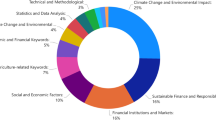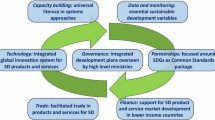Abstract
Avoiding double counting of emission reductions is a key policy concern to Parties to the United Nations Framework Convention on Climate Change (UNFCCC). Double counting of emission reductions can occur when a single greenhouse gas emission reduction or removal, achieved through a mechanism issuing units, is accounted more than once towards attaining mitigation pledges. We systematically assess how double counting can occur and how it could be addressed. We identify that double issuance – the issuance of two units for the same reductions – and double claiming – the accounting of the same reductions both in a greenhouse gas inventory and in units towards attaining a mitigation pledge – are the most important forms of double counting. They can occur not only directly, but in rather indirect ways which can be challenging to identify. Addressing double counting effectively requires international coordination in three areas: accounting of units, design of mechanisms that issue units, and consistent tracking and reporting on units. While international agreement on principles for accounting and mechanism design is crucial to preventing double counting, the governance arrangements for implementation and international oversight could vary. This article discusses options and makes recommendations for rules to address double counting in two distinct periods: through 2020 and post-2020 under a potential new international climate regime.
Similar content being viewed by others
Notes
For simplicity, we do not reflect other reduction obligations, such as mandatory cancellations to address non-permanence of to compensate for excess issuance of units.
References
Canaveira P (2013) Options and Elements for an Accounting Framework for the Land Sector in the Post-2020 Climate Regime. Terraprima Report to the Swiss Federal Office for the Environment
Climate Action Reserve (2011) Program Manual. http://www.climateactionreserve.org/how/program/program-manual. Cited 7 July 2014
Erickson PA, Lazarus M (2013) Implications of international GHG offsets on global climate change mitigation. Climate Policy 13(4):433–50. doi:10.1080/14693062.2013.777632
Gold Standard Foundation (2013) Gold Standard Registry Terms of Use. Last updated 18 November 2013. http://www.goldstandard.org/about-us/project-registry. Cited 7 July 2014
Hood C et al (2014) GHG or not GHG: accounting for diverse mitigation contributions in the post-2020 climate framework. Organisation for Economic Co-operation and Development and International Energy Agency, Paris
Lazarus M, et al. (2014) Single year mitigation targets: Uncharted territory for emissions trading and unit transfers. Stockholm Environment Institute Working Paper 2014–01. http://www.sei-international.org/publications?pid=2487
Prag A, et al. (2011) Tracking and Trading: Expanding on Options for International Greenhouse Gas Unit Accounting after 2012. Organisation for Economic Co-operation and Development and International Energy Agency, Paris. http://dx.doi.org/10.1787/5k44xwtzm1zw-en
Prag A, et al. (2013) Made to Measure: Options for Emissions Accounting under the UNFCCC. OECD/IEA Climate Change Expert Group Paper No. 2013(1). Organisation for Economic Co-operation and Development and International Energy Agency. http://dx.doi.org/10.1787/5jzbb2tp8ptg-en
United Nations Environment Programme (UNEP) (2013) The Emissions Gap Report 2013: A UNEP Synthesis Report. http://www.unep.org/publications/ebooks/emissionsgapreport2013/. Cited 7 July 2014
United Nations Framework Convention on Climate Change (UNFCCC) (2012a) Various Approaches, Including Opportunities for Using Markets, to Enhance the Cost-Effectiveness Of, and to Promote, Mitigation Actions, Bearing in Mind Different Circumstances of Developed and Developing Countries: Technical Paper. FCCC/TP/2012/4
United Nations Framework Convention on Climate Change (UNFCCC) (2012b) Decision 19/CP.18: Common tabular format for “UNFCCC biennial reporting guidelines for developed country Parties”. http://unfccc.int/resource/docs/2012/cop18/eng/08a03.pdf#page=3. Cited 7 July 2014
Verified Carbon Standard (VCS) (2012) Double Counting: Clarification of Rules. VCS Policy Brief. http://www.v-c-s.org/program-documents/guidance-double-counting. Cited 7 July 2014
Verified Carbon Standard (2013) Registration & Issuance Process, v.3.5. VCS Version 3 Procedural Document, 8 October 2013. http://www.v-c-s.org/program-documents. Cited 7 July 2014
World Resources Institute (WRI) (2013a) Greenhouse Gas Protocol Mitigation Goals Accounting and Reporting Standard: Second Draft for Pilot Testing. http://www.ghgprotocol.org/mitigation-accounting. Cited 7 July 2014
World Resources Institute (WRI) (2013b) Greenhouse Gas Protocol Policy and Action Accounting and Reporting Standard: Second Draft for Pilot Testing. http://www.ghgprotocol.org/mitigation-accounting. Cited 7 July 2014
Acknowledgments
This article was prepared in the context of a larger research project on accounting issues related to market mechanisms which was funded by the Swiss Federal Office for the Environment. Any views expressed are those of the authors and do not necessarily reflect the official views of the Swiss government or any other organization. The research team bears sole responsibility for the content. We would like to thank Laurence Mortier (Switzerland), Gregory Briner and Christina Hood (OECD), Jerry Seager (Verified Carbon Standard), Abhishek Goyal and Lisa Rosen (The Gold Standard Foundation), Derik Broekhoff (Climate Action Reserve), and the UNFCCC Secretariat for helpful comments provided in the context of the larger research project.
Author information
Authors and Affiliations
Corresponding author
Rights and permissions
About this article
Cite this article
Schneider, L., Kollmuss, A. & Lazarus, M. Addressing the risk of double counting emission reductions under the UNFCCC. Climatic Change 131, 473–486 (2015). https://doi.org/10.1007/s10584-015-1398-y
Received:
Accepted:
Published:
Issue Date:
DOI: https://doi.org/10.1007/s10584-015-1398-y




